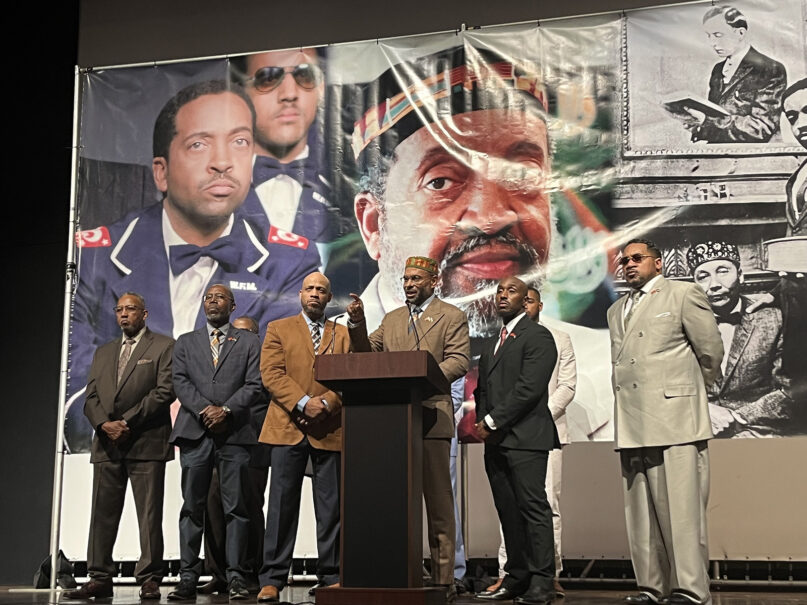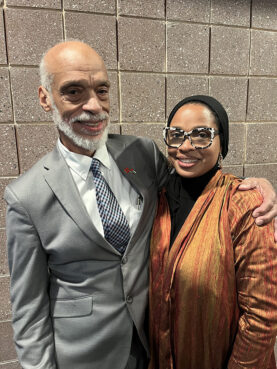
NEWARK, N.J. (RNS) — As Newark Mayor Ras Baraka accepted an award from the Muslim-American Ministry for Human Salvation on Sunday (Oct. 26), he praised how the Nation of Islam, a Black nationalist Islamic movement from which MAMHS was derived, left a mark on the city.
“It is without question that Newark is a Muslim town,” Baraka said. “We still feel and understand the teachings of the Honorable Elijah Muhammad and W. (Warith) Deen Muhammad at the same time.” Elijah Muhammad was an early leader of the NOI and Warith Muhammad, his son, also served as a leader.
Nearly 100 supporters attended the ceremony at Newark’s Central High School, part of MAMHS’ fifth annual Muslim-American Day of Leadership. Above all, attendees came to hear from Imam Earl Abdulmalik Mohammed, who founded MAMHS in 2019 and considers himself Warith Muhammad’s successor.
The WDM Faith & Just Society Humanitarian Award, named after Warith Muhammad, was given to Baraka in recognition of his decades-long engagement in Newark. In May, the third-term Democratic mayor made headlines after being arrested for trying to visit Delaney Hall, the East Coast’s largest U.S. Immigration and Customs Enforcement detention facility.
The presentation also commemorated the 50th anniversary of Warith Muhammad’s appointment as NOI leader in 1975, a position he held until he died in 2008.
For MAMHS, which has distanced itself from the NOI’s controversial Black supremacist discourse, hosting the event offered a chance to celebrate its roots and connections with Muslim African American traditions while asserting its views on issues from the war in Gaza to the Trump administration’s immigration policies.
Born out of Detroit in 1930, the NOI was created by Elijah Muhammad, whose preaching on self-empowerment and Black supremacy galvanized hundreds of thousands of African Americans. During its heyday, the organization counted boxing champion Muhammad Ali and civil rights leader Malcolm X in its ranks, who both parted ways with the organization after converting to Sunni Islam.
After Elijah Muhammad died in 1975, the movement split followers between his son and successor, Warith Muhammad, and Louis Farrakhan, an NOI representative. As Warith Muhammad ditched his father’s theology to align with mainstream Islamic teachings, Farrakhan embraced Elijah Muhammad’s Black nationalist theology.
After Warith Muhammad’s death in 2008, Earl Mohammed, his longtime assistant, assumed leadership of followers and further transformed the branch of the movement. In 2019, he founded the MAMHS to centralize efforts.
In 2014, after he pleaded guilty to deceiving customers purchasing precious metals online and was sentenced for mail fraud, Earl Mohammed served seven years of a nine-year prison sentence in a North Carolina federal prison, Religion News Service reported. In prison, he self-published two books, including “On Nature and Nations: The Muslim-American Message for Humanity in the Day of Religion.” He was released in 2020 due to the COVID-19 pandemic.
Though they share “no formal connection,” Earl Mohammed told RNS after the event that the NOI and MAMHS leadership still communicate. “They send us words of encouragement and acknowledgment. … We pray for their good success in those things, but we don’t have any formal ties with them,” he said.

Imam Earl Abdulmalik Mohammed, center, speaks during a Muslim-American Leadership Day event hosted by the Muslim-American Ministry for Human Salvation on Oct. 26, 2025, in Newark, N.J. (RNS photo/Fiona André)
Both organizations have seen their influence decline in recent years. Farrakhan’s homophobic and antisemitic diatribes have cast the NOI as a fringe organization.
According to a 2019 Pew Research Center study, while Black Muslims make up about 5% of all U.S. Muslims, just “two of every 100 Black Muslims surveyed say they currently identify with the Nation of Islam.”
MAHMS counts supporters in all major cities but isn’t affiliated with local mosques, Earl Mohammed said. Though he celebrates the movement’s roots in Black nationalism, he said MAMHS now aims to reach Muslims across ethnic groups.
“Black Muslims, that language is awkward,” he said. “Islam cherishes human identity. … Islam doesn’t permit us to categorize ourselves in ways that isolate us from other people,” noting the organization’s leadership is African American.
Still, Sunday’s event featured many remnants of NOI culture. On stage, a large banner displayed photos of Warith Muhammad’s NOI era.
The group is also involved with interfaith work, noting partnerships with Muslim organizations worldwide for humanitarian efforts geared toward Myanmar’s Rohingya, Kashmiri Muslims and Palestinians in Gaza and the West Bank.
“It’s not possible for us to live in America and isolate ourselves,” Earl Mohammed told RNS. “It’s selfish to do that. We have to seek out relationships and build strong bonds between the people of the various faiths.”
In his hourlong speech, titled “The struggle for moral destiny: How does good prevail in an age of tyranny?” he spoke at length about the war in Gaza being a moral test for religious American leaders. He denounced the “indiscriminate killing of innocent people in Gaza” and Israel’s “continued campaign in the West Bank against Palestinians.” He also cast doubt on the fragile ceasefire in the region.

Faridah Abdul-Tawwab Brown, right, and her father, Qasim Abdul-Tawwab, Oct. 26, 2025, in Newark, N.J. (RNS photo/Fiona André)
“The false ceasefire in occupied Palestine is an anti-moral theater zone,” he said, wearing a pin of a Palestinian flag attached to an MAHMS flag, showing a green Quran on a red background. “It’s not reality. It’s for theatrical purposes before the world.”
The leader also spoke about the relevance of the organization’s message in regard to the Trump administration’s mass deportation agenda and what he sees as the weakening of American democracy.
For Faridah Abdul-Tawwab Brown, who was raised in the NOI tradition, messages of these groups are still relevant today. She attended a Clara Mohammed School — an NOI network of private Islamic K-12 schools for girls — and said these institutions raised her to be confident and exert agency. Now an educator, Abdul-Tawwab Brown identifies as a Bilalian, a term coined by Warith Muhammad in reference to a Black slave, Bilal ibn Rabah, who embraced Islam after being freed and was a companion of the Prophet Muhammad. The designation calls for Black Muslims to embrace their faith and African American identity.
“That shaped my entire identity and how I function as a mother, a wife and moving in the world as an educator,” she said at the event. “I’ve carried that with me through my whole life because I believe that God was the creator and the architect of my character and my right to be at the table of human brotherhood.”
